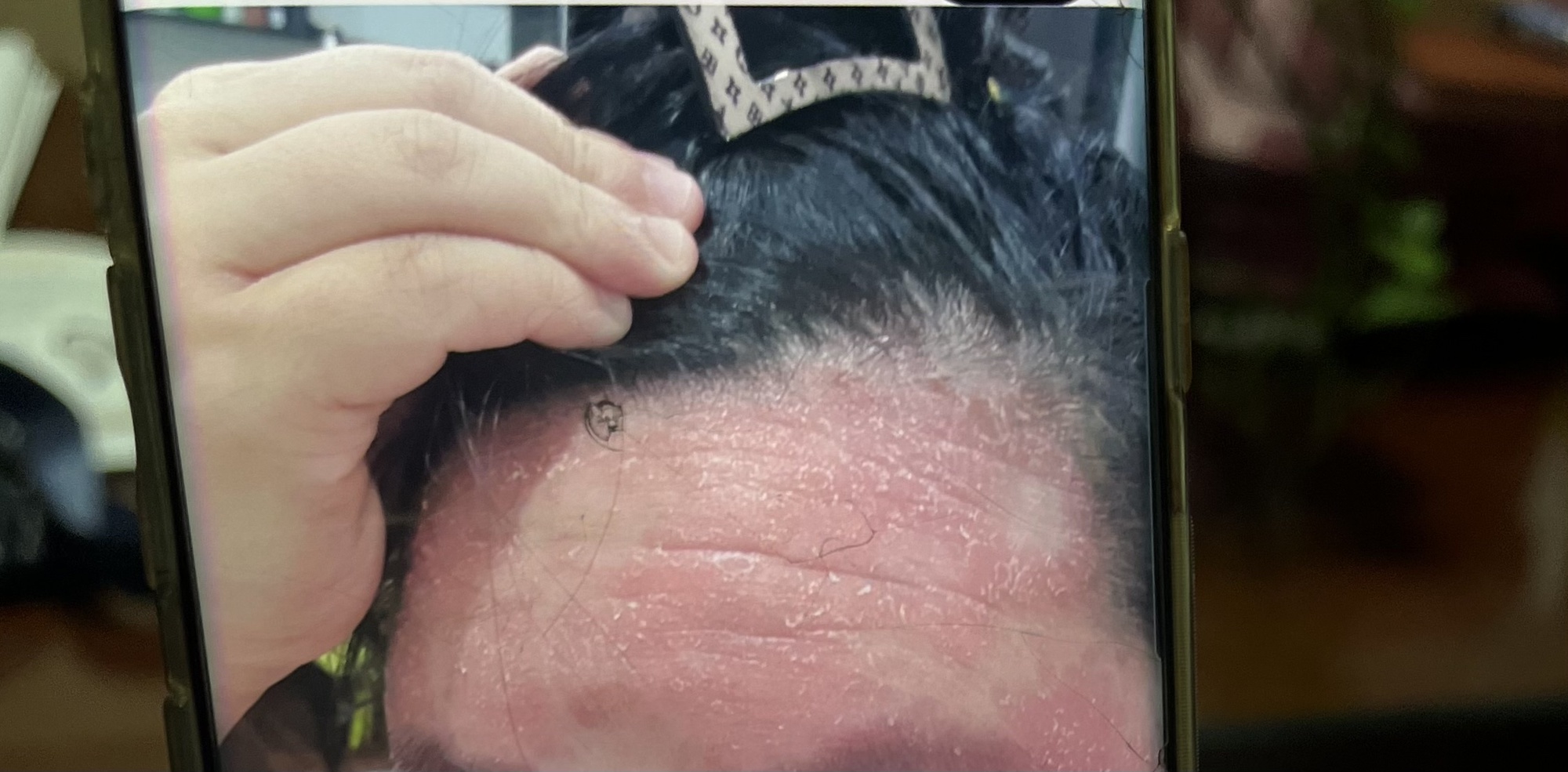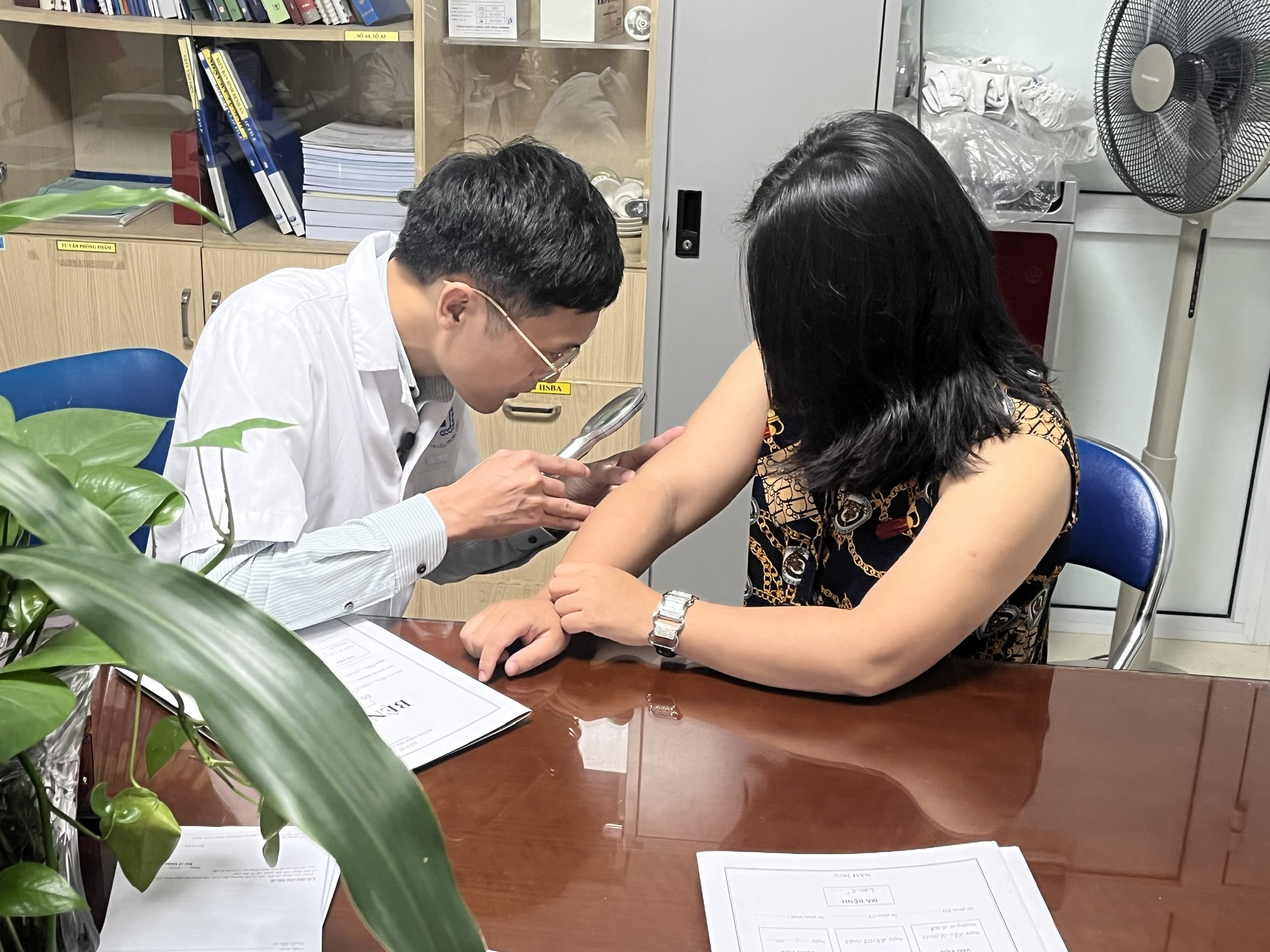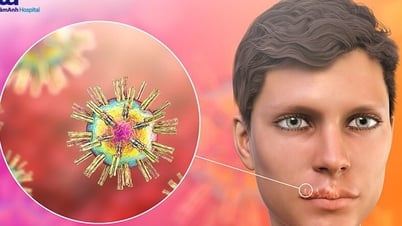Soaking, bathing, and applying herbal medicine can cause the disease to flare up.
At the Central Dermatology Hospital recently, female patient Nguyen Thanh H. (37 years old) in Hanoi came for a follow-up examination and was assessed by the doctor that her psoriasis was under stable control.
Ms. H. shared that she had heard about herbalists and had traveled to distant provinces to get medicine to drink, bathe, soak, and apply to treat psoriasis. At first, after applying, soaking, and bathing, her skin was less itchy. But after a while, the lesions thickened, inflammation appeared in the affected area and oozed, the lesions spread all over the body, and were infected.

Psoriasis lesions flared up all over the head, face and body after treatment with drugs of unknown ingredients and origin.
"The herbalist did not tell me what medicine it was, just told me to use it and drink it. However, the skin lesions spread, causing itching and burning pain. Unable to bear the condition, I went to the Central Dermatology Hospital for examination," said Ms. H.
Regarding the above case, Dr. Hoang Van Tam, Deputy Head of the Department of Daytime Inpatient Treatment (Central Dermatology Hospital), said that patient H. came to the clinic with red skin all over his body and flaking. Psoriasis is a chronic disease that requires long-term treatment, so patients often get discouraged and go to treatment facilities with drugs of unknown origin, after which the disease becomes more severe.
"For patient H., we applied topical medication, then switched to ultraviolet light therapy. Up to now, we have treated 4-5 sessions of light therapy. Currently, patient H.'s disease is almost completely under control," Dr. Tam assessed.
According to the Central Dermatology Hospital, psoriasis is related to immune disorders in the body. The impact of external factors that trigger or aggravate the disease such as: trauma, infection, stress. Therefore, people with psoriasis need to maintain an optimistic spirit, follow a healthy, balanced and nutritious diet, in which they should supplement foods rich in antioxidants according to the advice of a specialist.

Psoriasis patients need to return for check-ups and follow treatment as prescribed by their doctor. There is no cure for psoriasis.
Comply with your doctor's treatment and regularly return for follow-up appointments. Do not take medication on your own (especially traditional medicine, herbal medicine, or medicine containing corticosteroids).
It is important to keep the skin affected by psoriasis moisturized regularly. Keep the skin moisturized by applying moisturizer frequently, after bathing and whenever the skin feels dry.
Medicines of unknown ingredients, containing toxic heavy metals
In practice, Dr. Tuan said that most patients with severe psoriasis before coming to the hospital had used unproven methods or drugs of unknown origin. This can make the disease worse; from mild to severe forms such as pustular psoriasis or psoriatic arthritis.
Dr. Tam noted that in the past, when medicine did not have many treatment methods, medicines from plants and leaves had unknown ingredients and origins and were found to have been mixed with some heavy metals, including mercury, to increase treatment effectiveness. Using these heavy metals for a long time can affect the skin and the whole body.
The second group that is often mixed in is corticoid. With this substance, symptoms may decrease quickly but then the disease relapses very severely and affects internal organs such as: stomach, digestive system, adrenal glands and other organs such as eyes, musculoskeletal system.
Doctor Hoang Van Tam, Central Dermatology Hospital
Source link


![[Photo] More than 17,000 candidates participate in the 2025 SPT Competency Assessment Test of Hanoi National University of Education](https://vphoto.vietnam.vn/thumb/1200x675/vietnam/resource/IMAGE/2025/5/17/e538d9a1636c407cbb211b314e6303fd)



![[Photo] Readers line up to visit the photo exhibition and receive a special publication commemorating the 135th birthday of President Ho Chi Minh at Nhan Dan Newspaper](https://vphoto.vietnam.vn/thumb/1200x675/vietnam/resource/IMAGE/2025/5/17/85b3197fc6bd43e6a9ee4db15101005b)
![[Photo] Prime Minister Pham Minh Chinh chairs meeting on science and technology development](https://vphoto.vietnam.vn/thumb/1200x675/vietnam/resource/IMAGE/2025/5/17/ae80dd74c384439789b12013c738a045)






























![[Photo] Nearly 3,000 students moved by stories about soldiers](https://vphoto.vietnam.vn/thumb/1200x675/vietnam/resource/IMAGE/2025/5/17/21da57c8241e42438b423eaa37215e0e)



































































Comment (0)